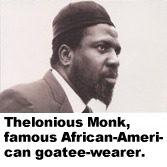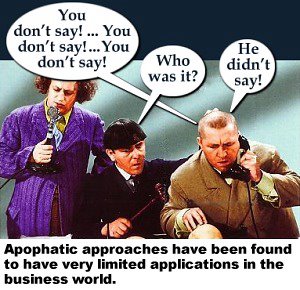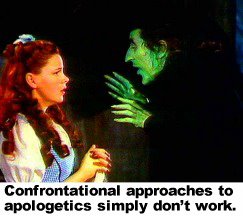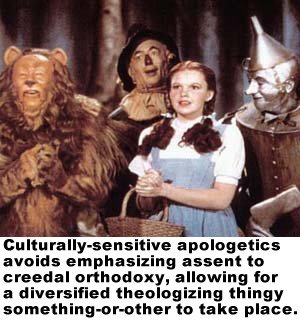


 Flannelgraph Jesus is not sure he has the “secret message” down yet.
Flannelgraph Jesus is not sure he has the “secret message” down yet.



 Flannelgraph Jesus is not sure he has the “secret message” down yet.
Flannelgraph Jesus is not sure he has the “secret message” down yet.
And then there was this:Dear Ish,
I find myself strangely attracted to the Emerging Church, despite the fact that I’m African-American. I was introduced to it by one of my fellow students here at M.I.T. and I find it quite stimulating. I’ve even skipped meetings of the campus chess club on more than one occasion just to be there.
Some of the cultural adjustments I’ve had to make to fit in with the EC have been challenging, however. For one thing, I’ve had to learn to avoid expressing my opinions in matters of aesthetic taste. Don’t get me wrong: Green Day’s music isn’t as bad as it sounds. But I’m not sure how much further I can stretch.
Lately I’ve been living under the shadow of a brooding cloud of angst. Do I have to wear a goatee to really belong in the EC? At first it seemed that only the leaders wore them. But on the last two Sundays I looked around and it seems like everyone's growing one (or trying to)! I’m not sure if I can take that step. What should I do?—Misgivings in Massachusetts
Yo, Ish!
Like I gots me dis problem, dig? First wuz dat I couldn’ fine none of deez e-merging places in ma hood, so I hads to jet somewheres else. Den, when I gets dare an’ starts kickin’ it its like—’sup wi’ all deez crackahs wearin’ mohawks on der chins an ever-thin? Like, I don’ mine all da candles, cuz I tries to keep da lights down in ma crib anyhow. An’ deez “eye-kons” o’ whatevah—it's like, if yo’ wanna get yo’ crayola thing on, dat’s cool. But dat south-pole fuzz dat blows around on a windy day—to me it jes looks wack. But den I’s wond’rin: is dat what da thugs in dis hood wear o’ what? Cuz like—I don’ wanna mess wit no body’s turf—uh-uh! I’s already gots me ’nuff problems with da stuff ’round ma own crib! You down wit’ dis?
—Tryin’ to Chill in Philly
 Believe it or not, I can strongly empathize with the plight you’re both enduring. The first time I saw a goatee on an emerging college sophomore a few years ago, I nearly shot a mouthful of Starbucks out my nose. You see, in my mind, goatees will forever be associated with the character of Maynard G. Krebs on an old TV show called “The Many Loves of Dobie Gillis,” which had been in re-runs for a few years by the time I was old enough to notice it. By that time (the mid-to-late ’60s) Jack Kerouac, beatniks, and the “beat generation” had been replaced by the Beatles, hippies, Yippies, and the SDS, as the youth culture’s new avant-garde—a term that isn’t used as much today as it was back then, but it’s fairly descriptive of how the Emerging Church thinks of itself.
Believe it or not, I can strongly empathize with the plight you’re both enduring. The first time I saw a goatee on an emerging college sophomore a few years ago, I nearly shot a mouthful of Starbucks out my nose. You see, in my mind, goatees will forever be associated with the character of Maynard G. Krebs on an old TV show called “The Many Loves of Dobie Gillis,” which had been in re-runs for a few years by the time I was old enough to notice it. By that time (the mid-to-late ’60s) Jack Kerouac, beatniks, and the “beat generation” had been replaced by the Beatles, hippies, Yippies, and the SDS, as the youth culture’s new avant-garde—a term that isn’t used as much today as it was back then, but it’s fairly descriptive of how the Emerging Church thinks of itself. Meanwhile, take heart. When’s the last time you saw some white guy do something new or start dressing funky and millions of black people suddenly tripped all over themselves trying to act or dress the same? (Why do you think all those white beatniks started wearing goatees in the first place?) If you two found a way to grow your eyebrows long and tie them in bows behind your heads, most of the white guys in your churches would be Googling for hair-growing chemicals within the next half-hour.
Meanwhile, take heart. When’s the last time you saw some white guy do something new or start dressing funky and millions of black people suddenly tripped all over themselves trying to act or dress the same? (Why do you think all those white beatniks started wearing goatees in the first place?) If you two found a way to grow your eyebrows long and tie them in bows behind your heads, most of the white guys in your churches would be Googling for hair-growing chemicals within the next half-hour.

[1] These are the generations of evangelicalism in the land of North America.
 [2] Now congregationalism begat Pilgrims who sailed from Leiden to Massachusetts and were soon joined by their brothers, the Puritans. [3] Pilgrims and Puritans begat theocracy, which in the days of Hutchinson, also called Anne, and Williams, also called Roger, begat discontent. [4] Discontent begat Baptists, and soon all manner of church polities and creeds prospered in the land, while prosperity itself begat spiritual apathy and slumber. [5] Then came a day of Great Awakening, which begat New Lights. [6] And thus did the Old Lights squint, and great was their outcry throughout the land, [7] but the sons of Edwards and the sons of the Wesleys and the sons of Whitefield did not heed their cries, [8] for they saw the mighty works that God wrought among them.
[2] Now congregationalism begat Pilgrims who sailed from Leiden to Massachusetts and were soon joined by their brothers, the Puritans. [3] Pilgrims and Puritans begat theocracy, which in the days of Hutchinson, also called Anne, and Williams, also called Roger, begat discontent. [4] Discontent begat Baptists, and soon all manner of church polities and creeds prospered in the land, while prosperity itself begat spiritual apathy and slumber. [5] Then came a day of Great Awakening, which begat New Lights. [6] And thus did the Old Lights squint, and great was their outcry throughout the land, [7] but the sons of Edwards and the sons of the Wesleys and the sons of Whitefield did not heed their cries, [8] for they saw the mighty works that God wrought among them. [9] Then the sons of men listened to the Paineites, who spoke of “Common Sense,” and “The Crisis,” and [some mss. read “later” here] “The Age of Reason,” and the kings of the earth took sides and waged war, and the Montesquieuites and Rousseauites rose up in the land, [10] and they said, “Let us be called the United States of America, where no king rules from New England to Florida, and west to the Mississippi!” [11] And so every man believed that which was right in his own eyes, and thus it was even after the warring ceased.
[12] In the turmoil of those days a great darkness fell upon the land, and men looked for light, both old and new, but could not find it. [13] The sons of Calvin and the sons of Arminius cried out, and behold, the land was soon filled with Taylorites and Finneyites who imagined that they created the light themselves. [14] But nevertheless the light spread, and a Second day of Great Awakening came, which begat revivalism, and revivalism begat manipulative evangelistic techniques, and manipulative evangelistic techniques begat many verses of “Just As I Am.”
[15] Now in those days, a son of Africa was counted as three-fifths of a person, and could be owned by a son of Europe in the region of Dixie. [16] And for two generations the Foxites and the Wesleyites stirred up many of their evangelical brethren to cease this abomination, crying, “Abolition! Abolition!” [17] But before the reign of Lincoln could commence, the cries went out from Dan, Virginia, to Beersheba, South Carolina: “Secession! Secession!” [18] And, lo, 600,000 men were slain on the field of battle before the rebellion was ended.
[19] Soon after, when every man had returned to his house, behold, Moody said to Sankey, “Let us sing great hyms to large crowds in spacious halls on both sides of the Atlantic!” [20] And thus revivalism, which had begotten manipulative evangelistic techniques, now also begat mass evangelism, [21] and mass evangelism begat interdenominational cooperation, [22] and interdenominational cooperation begat organizations, and agencies, and publishing houses, and Bible conferences.
[23] But while the sons of Darby gathered in Niagara, the sons of Schleirmacher said to the sons of Darwin, “Let us circumscribe the truth of Scripture according to the limits of our scientific presuppositions.” And it was so. [24] And when the sons of Luther, and the sons of Calvin, and the sons of Arminius, and of Wesley, and even of Moody and of Darby—when they heard of these things—each one said to the other, “If the foundations are being destroyed, what should the righteous do?” [25] And thus they took up pen and ink, and each man flew to his printing press, and each man contacted his colporteur, they did great battle against the sons of Schleirmacher and the sons of Darwin, and all who would come against them. [26] Now the rest of their acts, and all they did in defense of the propositional truth of Scripture, are they not written in the books of The Fundamentals?
This year I resolve to find something crucial to evangelicalism, re-define what it should mean, and then write a book about it that will hack a lot of people off, but also get me invited to speak at conferences and such.
I resolve to season my writing with self-deprecating remarks transparently designed to disarm critics while emboldening sycophants.
In my writing I resolve to make a lot of outrageous-sounding statements calculated to make certain people’s blood boil, and then make them read a ways further or examine the footnotes to find all my disclaimers and qualifications.To make myself feel better about the previous resolution, I’ll rhetorically shrug that—hey!—even I find some of the stuff I write a bit offensive, so how can I blame anyone who stops reading?
I resolve to compare opponents who keep reading beyond my warnings to some sort of nasty insect. (How about hornets? ... Seriously—I’m not bitter. Really!)
I resolve to brush with broad strokes, and when somebody points out that I painted over the truth, I’ll just say, “Oops!” and refer them back to my disclaimers.I resolve to build an army of straw men and then defeat them in a monumental battle between sloppy caricatures and gross over-simplifications.
I resolve to reduce some major doctrine to its biblical metaphor, and then exchange that metaphor for one more to my liking the way people get rid of eyeglass frames that are no longer in style.
I resolve to completely dismantle the central tenets of someone else’s orthodoxy and call it a “slight revision.”
I resolve to de-emphasize the personal, individualistic aspect of salvation. It would probably help if I simultaneously de-emphasize the doctrine of hell.
I resolve to bring together mutually-contradictory positions by using the slash key (“/”) on my keyboard, and before anyone has a chance to point out that they’re utterly irreconcilable I’ll start talking about “moving beyond” both options to “a generous third way.”I resolve to generously sprinkle positive-sounding words and phrases like “generous,” “enriched,” and “less rigid” into descriptions of my opinions, while spiking contrary views with words like “defensive,” “preoccupied,” and “nauseating.”
I resolve to be more like my friend, Chester.
I resolve to be more embarrassed by traditional evangelicalism than I have been in the past.
But knowing me, by mid-February I’ll have blown every one of them. (Sigh!)I resolve to forget or distort a lot of recent church history in order to fulfill the previous resolution.
I resolve to watch more “Christian” television so I know what I’m supposed to be embarrassed about, and then go around suggesting to evangelicals that that’s what they actually look like.I resolve to be generous with my orthodoxy, but never to the point of giving it away in the form of a tract, because then someone might confuse being missional with making absolute truth claims.
 On the first day of Christmas my pastor gave to me—
On the first day of Christmas my pastor gave to me— Once upon a time, there was a little girl named Goldie Lox who left her little postmodern condo to go for a walk in the forest of worldviews. Pretty soon, she came upon what looked like a shopping center, because, in fact, it used to be one, but had recently been converted into a mall to accomodate three evangelical Christian churches. As she looked around for a sign showing the hours of operation she tried one of the doors, and since it was unlocked she walked right in.
Once upon a time, there was a little girl named Goldie Lox who left her little postmodern condo to go for a walk in the forest of worldviews. Pretty soon, she came upon what looked like a shopping center, because, in fact, it used to be one, but had recently been converted into a mall to accomodate three evangelical Christian churches. As she looked around for a sign showing the hours of operation she tried one of the doors, and since it was unlocked she walked right in.
 Well, it’s the Christmas season in the good ol’ U.S. of A., and here at Starbucks I’m cuddling up to my appropriately cross-cultural and yet seasonal Ethiopia Sidamo Komodo Dragon Eggnog Latté as I sit in on a conversation between staffers from the new emergent church and a local realtor.
Well, it’s the Christmas season in the good ol’ U.S. of A., and here at Starbucks I’m cuddling up to my appropriately cross-cultural and yet seasonal Ethiopia Sidamo Komodo Dragon Eggnog Latté as I sit in on a conversation between staffers from the new emergent church and a local realtor. So I decided to take this missional apologetics course from the most popular professor on campus, Dr. Addlefinger, because, as you know, I’m both missionally and apologetically challenged. And this prof is, like, so cool that he has 1 Corinthians 9:19-23 tattooed around his neck in Yiddish. Of course, you can only see it when he isn’t wearing a Roman collar, and even then Jewish people have to keep turning him around counterclockwise to get the whole thing. He also has a tongue ring with one of the Stations of the Cross inscribed on it, but since he eats a lot of garlic (because of all his Wiccan friends) I’m not sure which one it is. What really convinced me to sign up for his course, however, was when I found out that he had his first name legally changed to J-Dog Thugnasty. Other people talk about recontextualization. Dr. Addle—er, I mean, The J-Man—has recontextualized himself right into the wallpaper of the postmodern global living room.
So I decided to take this missional apologetics course from the most popular professor on campus, Dr. Addlefinger, because, as you know, I’m both missionally and apologetically challenged. And this prof is, like, so cool that he has 1 Corinthians 9:19-23 tattooed around his neck in Yiddish. Of course, you can only see it when he isn’t wearing a Roman collar, and even then Jewish people have to keep turning him around counterclockwise to get the whole thing. He also has a tongue ring with one of the Stations of the Cross inscribed on it, but since he eats a lot of garlic (because of all his Wiccan friends) I’m not sure which one it is. What really convinced me to sign up for his course, however, was when I found out that he had his first name legally changed to J-Dog Thugnasty. Other people talk about recontextualization. Dr. Addle—er, I mean, The J-Man—has recontextualized himself right into the wallpaper of the postmodern global living room.
Anyway, we’ve been dialoguing for the past few weeks (The J-Man doesn’t “teach students,” he “dialogues with colleagues”) about all the latest cutting-edge missional approaches, and I must admit that I’ve been struggling with the new relational inculturation methodologies—mostly with how to spell them, but also with how to mine them for good conversation-starters for the heathen I meet at Starbucks. (“Is that a pentagram on your forehead? Did you know that there are technically five gospels, if you include Q?”)
Take all this buzz about applying mathematical set theory to missions. I mean, like, I stunk at math in school so bad that I was one of those kids who whined, “But when will I ever use this in real life?” when the teacher was showing us how to balance a checkbook. I’d rather diagram every sentence in the textbook than try to figure out how a centered set model is more suitable to a postmodern context than a bounded set model. And it seems I’m not the only one.
Anna: “This idea sucks!”
The J-Man: “Well, I’ve come to expect that kind of shallow response from a Baby-Boomer.”
Anna: “But I was born in 1972!”
Phil: “I think what Karen’s trying to say here is that this particular application of centered set theory to evangelism and ecclesiology inappropriately applies the criteria for inclusion in the invisible church to the mode of inclusion in the visible church, simultaneously resulting in an unbiblical methodology for the place of doctrinal catechesis in the life of the local church.”
Anna: “Are you saying I look like I’m over 40?!”
The J-Man: “Phil, I think you’re missing the inherently problematic nature of the traditional paradigm. But you might be more persuasive if you use words with more syllables next time.”
Anna: “Wait a minute! You’re the only Baby-Boomer in this room, except for Ishmael!”
Following my entire life’s primary working presupposition that the more inscrutable an idea is, the more an instructor will like it, dialogues like this one convinced me that it was in my best academic interest to get on board with this New Missional Thinking if I wanted my degree program to go smoothly. Besides, I finally figured out that it wasn’t so important what another person actually believed, but only what “direction” they were heading.
Whew! What a load off! Now I don’t have to worry about telling people whether they’re “right” or “wrong.” Instead, I can just say stuff like, “You’re getting warmer…warmer… Okay, now you’re getting colder…”
Anna’s big mistake, on the other hand, was dropping the course before she looked ahead in the syllabus to discover the group field activity later in the semester at a totally rad local watering hole called Slammers, which we were to visit as a group of fully-inculturated missional Christians while avoiding undue syncretism with the bootylicious babes and smooth operators who frequent the establishment. This is one of those places evangelicals do not normally enter unless either (a) their car breaks down at 2 a.m., their cell’s at home, and there’s no other place to call for help in that area code, or (b) they’re on a mission from God to replace its coasters with “4 Spiritual Laws” tracts. Even though both of those pressures were off in our case, our thinly-veiled titillation at the thought of “witnessing” (to use an obsolete term) at such a place quickly turned to very awkward slumping over imitation martinis (at least mine was) punctuated by brief attempts at cross-cultural communication.
Eventually a few of us spotted The J-Man taking in the view near an unused pool table, and we congregated over there next to him, attempting to put the best possible face on our thus-far blundering encounters with the natives.
In a transparent effort to impress the teacher, Drew spotted the pool balls racked up on the table, and blurted, “Look! A bounded set!”
To which Liz added, “Well, we can fix that!” And she removed the triangular rack from around the pool balls.
Unfortunately Jonathan decided to pick up a stick, and taking aim at the cue ball he said, “Watch out, here comes a Mormon missionary,” and shot, scattering the balls around the table.
“But none of the balls are heading back toward the center,” observed Liz.
At which point it suddenly it got very, very quiet, and we became intensely aware that most of the silence was coming from the general direction of The J-Man himself.
I don’t think any of us got a very good grade for that night’s assignment.

 Now I’ll be the first to admit that as I try to even skim the surface of the impressive body of literature that has been accumulating on What To Do About This Major Disaster, I soon become so overwhelmed by all its technical terminology that my mind drifts back to the “Green Acres” theme song, and I start seeing Eddie Albert bouncing on a tractor in a three-piece suit. But despite being totally out of my depth here, I think I’ve gleaned just a few basic principles that separate the old way from the new way, and upon which I think we would all do well to reflect. And as part of my unceasing effort to boil down exceedingly complex issues so that even a counter-cult apologist can understand them, I present them as follows:
Now I’ll be the first to admit that as I try to even skim the surface of the impressive body of literature that has been accumulating on What To Do About This Major Disaster, I soon become so overwhelmed by all its technical terminology that my mind drifts back to the “Green Acres” theme song, and I start seeing Eddie Albert bouncing on a tractor in a three-piece suit. But despite being totally out of my depth here, I think I’ve gleaned just a few basic principles that separate the old way from the new way, and upon which I think we would all do well to reflect. And as part of my unceasing effort to boil down exceedingly complex issues so that even a counter-cult apologist can understand them, I present them as follows: “He’s not the brightest candle on the menorah, is he?”
“He’s not the brightest candle on the menorah, is he?”  As I was crossing the intersection of Faith and Culture the other day, I narrowly avoided being run over by a truck belonging to the Society for Polysyllabic Advanced Missional Development (SPAMD). The guy walking next to me, however, was not so fortunate. I tried to warn him, but he was so absorbed in whatever he was listening to on his headphones that he didn’t hear me. (It turned out to be a book-on-tape edition of Calvin's Institutes.) At first I thought the truck driver didn’t notice the loud thud produced by the collision. But when I called SPAMD headquarters they advised me it was actually a part of a planned “worship experience” conducted by an “emerging church” that meets at that particular intersection, which it considers its ceremonial cross, and that the guy who got hit simply failed to adequately contextualize his own mission in that cultural setting. I guess now they have their representation of the corpus Christi. I hope the chalk lasts.
As I was crossing the intersection of Faith and Culture the other day, I narrowly avoided being run over by a truck belonging to the Society for Polysyllabic Advanced Missional Development (SPAMD). The guy walking next to me, however, was not so fortunate. I tried to warn him, but he was so absorbed in whatever he was listening to on his headphones that he didn’t hear me. (It turned out to be a book-on-tape edition of Calvin's Institutes.) At first I thought the truck driver didn’t notice the loud thud produced by the collision. But when I called SPAMD headquarters they advised me it was actually a part of a planned “worship experience” conducted by an “emerging church” that meets at that particular intersection, which it considers its ceremonial cross, and that the guy who got hit simply failed to adequately contextualize his own mission in that cultural setting. I guess now they have their representation of the corpus Christi. I hope the chalk lasts.
CLOUSEAU: "Does your blog bite?" HOTEL CLERK: "No" CLOUSEAU: "Nice bloggy--" BLOG: Snarl! Chomp! CLOUSEAU: "I thought you said your blog did not bite!" HOTEL CLERK: "That is not my blog."
